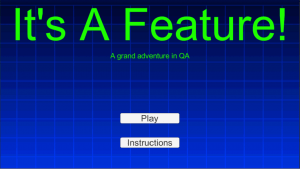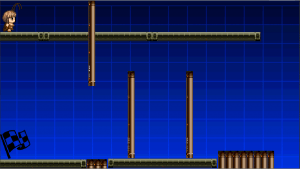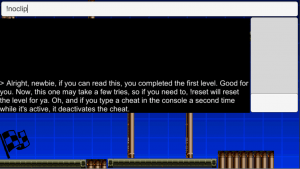Artist’s Statement
When coming up with an idea for a final project, I knew I wanted to do something digital, but I couldn’t think of a unique enough concept that would be feasible in the time I had with the skills I possessed. I eventually narrowed it down to either a game that utilizes cheat codes, or a game that used music input for controls. I decided on using the cheat code idea as that was the most developed of the two. As I started work on the project, I wonder what narrative possibilities there could be for this type of game and how I could spin the gameplay around such a narrative. QA testing was a quick idea stemming from my experiences on co-op and in other projects, so I tweaked the idea to make it a story about a newly hired QA tester dealing with a poorly made, unfinished product. Thus, the concept of It’s A Feature was born.
Inspiration for this project came from a combination of personal experience, previous works and material from this class. The material that I believe is related to this project is the Dada movement, which had a series of works that turned their respective media on their heads, while also focusing on the audience experience. My game is made to serve as a statement on the frustrations of QA and Bug Fixing, so I intentionally made it as tedious and inefficient as possible. However, I still wanted the game to feel like a game, with a goal and unique gameplay that maintained the line of challenging and entertaining, similar to how Dadaists maintained some tropes of their media while keeping up their avant-garde style, so I made sure not to go to overboard and provide sufficient tutorial in the console UI for players on any end of the learning curve. The reason I chose a developer’s console format for this game stemmed from my frequent playing and streaming of Garry’s Mod on PC. In GMod, players use a developer’s console to enter cheats such as flight, no collisions, killing all other players, launching nukes, among many other surreal features. I figured the console would be a simple enough format for gamers and designers like me and my classmates to pick up on, and sure enough, they managed to pick up on the system with very little assistance. Non-gaming inclined players might take a bit longer to grasp the system, but that’s why the tutorial is so descriptive.
Playtesting for this game occurred over several instances in two different classes. Overall, the game was very successful in bringing about intense frustration in the player, as the first couple of playtesters swore and screamed many times over the course of the game. Despite the frustration, they still said the game was fun and I had a clear and well-executed message. One complaint some playtesters had was that some of the UI needed to be tweaked in early iterations, specifically in the mock developer console, in order ton make the experience a little more realistic (i. e. Getting rid of inefficient buttons that could be replaced with a key press, and switching around some key commands to pertain to certain), but that was easily fixed in the more recent iteration.
Documentation:



Click below for .exe file:
This Class’s Effect On Me
The materials offered in this course on Dadaism, Kaprow Happenings, Andy Warhol, Yoko Ono, The Institute etc. focused a great deal on Human Experience, and they seem to have had a great effect on me during the course. All of my major projects had something to do with re-experiencing events with a modified perspective, and managed to cover various mediums of artwork instead of just the digital games I had become accustomed to working with.
My First Project took a simple, everyday action, eating a meal, and turned it into a music theory experience. It brought to light how little we think about mundane actions, and the psychological presence of music all around us. I found it to be a fascinating score, despite it’s non-game feel, and it opened up my prior inhibitions about any other experimental works in the class.
My Second Project, a more game-like one, doubled as an analysis of vernacular and tradition in gaming communities as well as a creative mod of a popular title. It helped me realize the hidden depths possible in a game that appropriated so many assets and mechanics, so long as they are executed properly and well-explained in any write-ups.
My Third Project, while a failure, was still ambitious in its concept and did manage to teach me something about development and human behavior. It was an ambitious guidance system that tried to drag people out of their comfort zone in public, as this class had done to me a couple of times. However, I didn’t manage my scope hard enough, and I didn’t take into account people’s willingness for public performance, and I couldn’t garner support for a playtest. Now, I have learned from that mistake and used the lesson learned in other projects this semester.
My Fourth Project is gone into detail above, and it was subjectively one of my better works this semester. I think I have greatly grown as a designer thanks to this course, with the materials, assignments, and other activities providing many new ideas to expand my scope for brainstorming and developing concepts. I am grateful for all the offerings this course had to help me grow and prepare for the field of game design, and hopefully I can continue to apply this acquired skills in future courses/assignments/projects/positions.
Thank you and good night.
